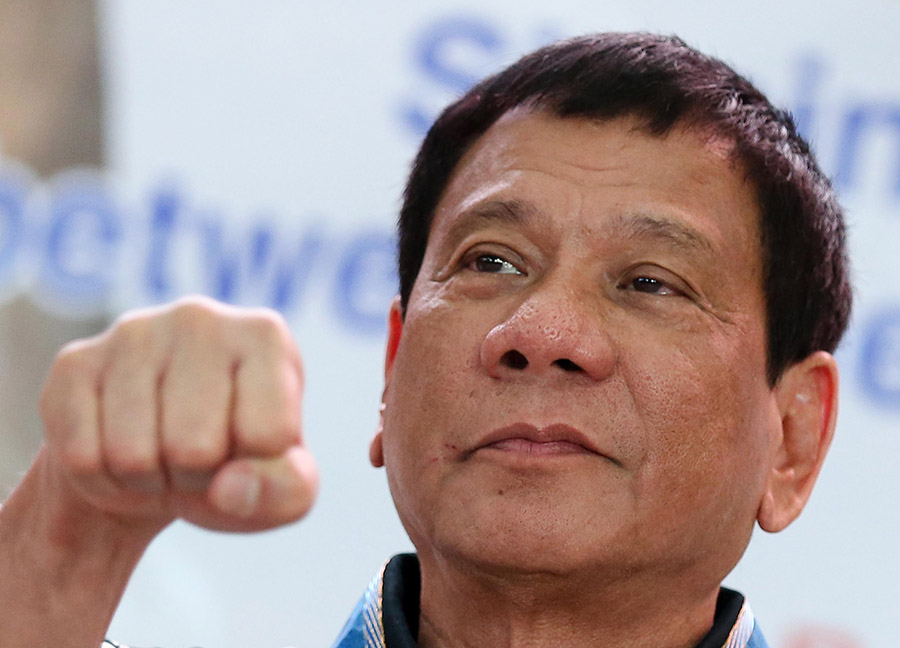Recently, Philippines conducted its national elections. The country’s Commission on Elections announced a historic 81.62% voter turnout, as Davao City Mayor Rodrigo Duterte broke President Benigno Aquino III’s record of votes garnered in 2010 and has become the presumptive president-elect.

Rodrigo Duterte. Photo: LYN RILLON
Besides his administrative record, characteristics of personality, governing philosophies and private-life gossips, media coverage has focused on Duterte’s designs of his future foreign policies. Western opinion attaches particular importance to his views towards the Philippines-China relationship and the two countries’ potential interaction on South China Sea issue.
Up to now, he’s sent mixed signals. In his various remarks. Duterte once noted that he has a similar position with China, and that he does not believe that the South China Sea issue could be solved through a verdict by the arbitration court. However, he clarified during the campaign that he “fully supports” the case now pending in the arbitral tribunal questioning China’s occupation of areas that the Philippines considers its territory.
Duterte was criticized by his rivals for a “weak position” in the South China Sea disputes and his willingness to enter into a deal with China. But the multilateral talk on the South China Sea that include the United States and Japan as well as the claimants proposed by Duterte obviously represent a violation of China’s insistence on bilateral approaches to address the disputes.
The self-contradictory positions of the presumptive president-elect reflected the political environment in the country. President Aquino has established clear policy direction in his term that the Philippines should be assertive in challenging China in the South China Sea. Even with China’s strong opposition, the Philippine government unilaterally initiated arbitration against China. At the same time, the country strengthened ties with the United States, with a specific purpose of counterbalancing China. The two countries signed an Enhanced Defense Cooperation Agreement (EDCA), which enables a rotating U.S. military presence at five Philippines bases. This move was viewed as an attempt to forestall “expansionary behavior by the Chinese Coast Guard” in the South China Sea. Philippines also took the lead in conducting joint South China Sea naval patrols initiated by the United States. To gain public support for the president’s foreign policy moves, China was portrayed as a threat to Philippines national interests in domestic publicity. Nationalism has been aroused and a biased impression of China has been hyped. It is difficult for anyone who would take over the presidency of the country to confront or even alleviate the current public opinion atmosphere.
The upcoming outcome of the arbitration leaves Duarte with less space for policy change. In Aquino’s term, arbitration was defined as a legal and peaceful solution of disputes that go along with Philippines’ national interests and claims. Any presidential candidate who opposed the arbitration would be criticized by rivals and suffer from approval rate drop. This partly explained why several major candidates, including Duterte, did not say no to the arbitration.
Duterte’s lack of experience in dealing with foreign affairs also leads to his ambiguity in South China Sea policies directions. He has worked as mayor of the Davao City for 28 years, gaining a lot of experience in local governance. However, he has not been closely involved in the key circle of foreign policy decision-making. It is likely that Duterte does not have a comprehensive and profound understanding of the developments of the South China Sea issues. What is worse, he may not be familiar with China’s policy intentions and behavior model.
China has sent out clear signals to Duterte. China’s Foreign Ministry spokespersons responded to several questions concerning the general election in the Philippines. China attaches importance to the relationship with the Philippines. In recent years, China has invested more resources in neighborhood diplomacy. China views the Philippines as a close neighbor and one of the countries that China needs to work with. China has closely followed the election in the country, and aims at building up future bilateral relations. China has urged that both sides should value the traditional friendship between the people of the two countries and avoid causing damage on this foundation for political ties.
Since China believes that the South China Sea issue has badly influenced the bilateral relationship, China has suggested that the Philippines’ presumptive president-elect make positive changes in related policies. China is looking forward to practical approaches of the new administration in Manila to appropriately address the problems and disputes.
China does not have unrealistic expectation for the Philippines, which is an ally of the United States and a key player in Washington’s rebalance strategy toward the Asia-Pacific. The United States has extended its congratulations to Duterte in a formal statement and praised the conduct of the elections. China is not demanding the Philippines to sever the alliance. However, China believes that Manila’s attempts to involve the U.S. in the South China Sea issue will not be helpful in bridging differences but will only make the situation more complicated.
Fundamentally, to maintain a good relationship is consistent with Philippines domestic development. Even though the country has successfully sustained rapid growth rate in previous years, some deep-rooted problems were not well-addressed and caused complaints from citizens. Duterte has put forward the idea that China will contribute to Philippines’ infrastructure construction. Actually, this is one of the important fields China has been pushed forward for cooperation.
The election provides the country an opportunity to review its long-term interests and work for a better environment for sustainable development. The country should also keep in mind the importance of the regional peace and stability. It is the time for change and make correct choices.